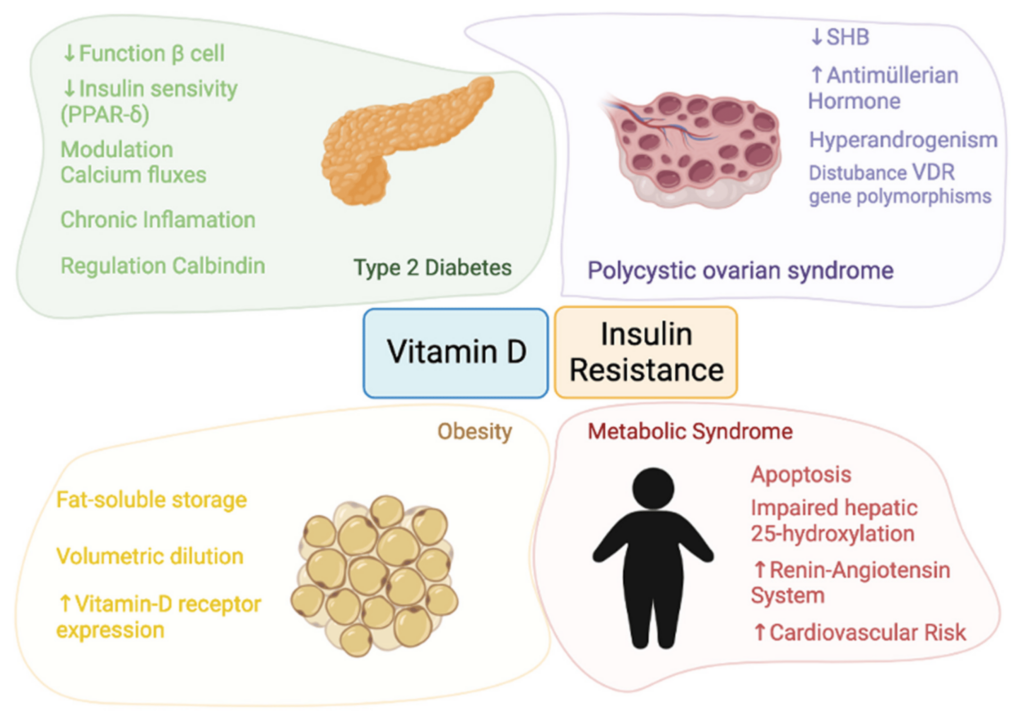
The role of Vitamin D and sun Exposure in weight lossThe pursuit of a healthy weight often leads us down a complex path of diet and exercise. But what if...
The role of Vitamin D and sun Exposure in weight loss
The pursuit of a healthy weight often leads us down a complex path of diet and exercise. But what if there's another factor influencing the equation: vitamin D and sun exposure? In this blog, we’ll delve into the intriguing relationship between these elements and their potential impact on weight loss.
Introduction
In recent years, the conversation around weight loss has shifted from simple calorie counting to a more holistic approach that includes various physiological and environmental factors. Among these, vitamin D and sun exposure have emerged as intriguing and potentially significant components. At LifeRx.md, we are committed to providing comprehensive, evidence-based insights into health and wellness.
Understanding Vitamin D
Vitamin D, also known as the "sunshine vitamin," isn't technically a vitamin; it's a group of prohormones. Our bodies can synthesize vitamin D3 (cholecalciferol) when exposed to ultraviolet B (UVB) rays from sunlight. However, diet also plays a role, with fatty fish, egg yolks, and fortified foods offering a smaller contribution. Vitamin D contributes significantly to bone health by facilitating the body's absorption of calcium and phosphorus. However, recent research suggests it may also influence metabolism and weight management.
Mechanism of Action
Vitamin D influences the body through the vitamin D receptor (VDR), which is present in almost every cell. Upon activation by vitamin D, VDR can regulate the expression of genes involved in various biological processes, including calcium and phosphorus metabolism, immune function, and cell growth.
The Intricate Link Between Vitamin D and Weight
The relationship between vitamin D and weight isn't fully understood, but several mechanisms suggest a potential link:
Vitamin D and Fat Metabolism
Research indicates that vitamin D may play a role in fat metabolism. For instance, higher levels of vitamin D have been associated with a greater capacity for fat oxidation during physical activity. This means that individuals with adequate vitamin D levels may burn fat more efficiently, which can aid in weight loss. A study published in the Journal of Clinical Endocrinology & Metabolism supports this, showing that participants with higher vitamin D levels exhibited improved fat oxidation rates, suggesting that sufficient vitamin D levels might enhance the body's ability to utilize fat as an energy source.
Appetite Regulation
Vitamin D may also influence appetite regulation. Supplementation with vitamin D has been shown to reduce levels of parathyroid hormone (PTH) and leptin. Leptin is a hormone that signals satiety, and lower levels may reduce feelings of hunger, potentially leading to decreased caloric intake. The American Journal of Clinical Nutrition published findings indicating that individuals who received vitamin D supplementation experienced significant reductions in PTH and leptin levels, which correlated with decreased appetite and food intake. This highlights the potential role of vitamin D in controlling hunger and promoting weight loss.
Insulin Sensitivity
 Insulin resistance is a common issue in obesity, leading to difficulties in weight management. Research indicates that vitamin D can improve the body's ability to utilize insulin effectively. Individuals with higher vitamin D levels tend to have better insulin sensitivity, which can facilitate glucose metabolism and reduce fat storage. A pivotal study in Diabetes Care revealed that participants with higher vitamin D levels demonstrated improved insulin sensitivity, which is crucial for effective glucose utilization and minimizing fat accumulation. This underscores the potential of vitamin D in addressing one of the core challenges in weight management.
Insulin resistance is a common issue in obesity, leading to difficulties in weight management. Research indicates that vitamin D can improve the body's ability to utilize insulin effectively. Individuals with higher vitamin D levels tend to have better insulin sensitivity, which can facilitate glucose metabolism and reduce fat storage. A pivotal study in Diabetes Care revealed that participants with higher vitamin D levels demonstrated improved insulin sensitivity, which is crucial for effective glucose utilization and minimizing fat accumulation. This underscores the potential of vitamin D in addressing one of the core challenges in weight management.
Sun Exposure and Weight Management
Vitamin D synthesis occurs naturally in the skin through exposure to sunlight. UVB rays from the sun trigger the body's production of vitamin D3. However, modern lifestyles and concerns about skin cancer have reduced the amount of time people spend outdoors, contributing to widespread vitamin D deficiency. A study in the Journal of Investigative Dermatology highlighted the seasonal variations in weight and vitamin D levels. Participants tended to gain weight during the winter when sun exposure was limited and lose weight in the summer with increased sun exposure, illustrating the impact of seasonal sunlight on body weight regulation. For optimal vitamin D synthesis, it is recommended to get about 10-30 minutes of midday sun exposure several times a week. Factors such as skin type, geographic location, and season can influence the amount of sun exposure needed.
- Skin Pigmentation: Melanin, the pigment that gives skin its color, reduces UVB ray penetration. People with darker skin tones might require longer sun exposure to produce sufficient vitamin D.
- Season and Location: UVB intensity varies based on geographic location and season. People living in northern latitudes or during winter months might struggle to get enough sun exposure.
- Sunscreen Use: While essential for sun protection, sunscreen can also block UVB rays needed for vitamin D synthesis.
LifeRx.md: Promoting Health and Wellness
 At LifeRx.md, we understand the complex interplay between various factors influencing weight loss. Our holistic approach integrates cutting-edge medical research with practical lifestyle recommendations, ensuring our clients receive comprehensive and personalized care. We believe that understanding and leveraging the role of vitamin D and sun exposure can significantly enhance weight management and overall well-being.
At LifeRx.md, we understand the complex interplay between various factors influencing weight loss. Our holistic approach integrates cutting-edge medical research with practical lifestyle recommendations, ensuring our clients receive comprehensive and personalized care. We believe that understanding and leveraging the role of vitamin D and sun exposure can significantly enhance weight management and overall well-being.
- Personalized Consultations: Our journey with clients begins with personalized consultations. During these sessions, we assess individual health profiles, including vitamin D levels, dietary habits, and sun exposure patterns. We utilize advanced diagnostic tools to measure serum 25-hydroxyvitamin D levels, providing a precise understanding of each client’s vitamin D status. This baseline assessment allows us to tailor our recommendations to each person's unique needs, ensuring more effective and sustainable outcomes.
- Vitamin D Optimization: For clients with low vitamin D levels, we develop targeted strategies to optimize their vitamin D status. This may include dietary modifications to incorporate vitamin D-rich foods such as fatty fish, fortified dairy products, and egg yolks. Additionally, we recommend high-quality vitamin D supplements when necessary, ensuring appropriate dosages to safely elevate vitamin D levels.
- Sun Exposure Guidance: Recognizing the crucial role of sun exposure in natural vitamin D synthesis, we provide tailored advice on how to achieve optimal sun exposure safely. We consider factors such as skin type, geographic location, and lifestyle to recommend specific times and durations for sun exposure. Our goal is to help clients synthesize sufficient vitamin D while minimizing the risk of skin damage.
- Integrative Lifestyle Recommendations: Beyond vitamin D and sun exposure, our holistic approach encompasses a range of lifestyle factors that contribute to weight loss and overall health. We offer guidance on balanced nutrition, incorporating whole foods that support metabolic health. Our experts provide exercise recommendations tailored to individual fitness levels, promoting physical activity that complements fat metabolism and insulin sensitivity.
- Continuous Monitoring and Support: At LifeRx.md, we believe that continuous monitoring and support are essential for achieving long-term health goals. We regularly track our clients’ progress, adjusting treatment plans as needed to ensure sustained improvements. Our supportive environment fosters motivation and accountability, helping clients stay on track with their health and wellness journey.
Conclusion
The relationship between vitamin D, sun exposure, and weight loss is multifaceted and backed by a growing body of scientific evidence. Adequate vitamin D levels, whether achieved through supplementation or sensible sun exposure, can support fat metabolism, appetite regulation, and insulin sensitivity, all of which are crucial for effective weight management. At LifeRx.md, we are dedicated to helping you navigate these insights and incorporate them into your health journey. By understanding and leveraging the power of vitamin D and sun exposure, you can achieve a healthier, more balanced life.